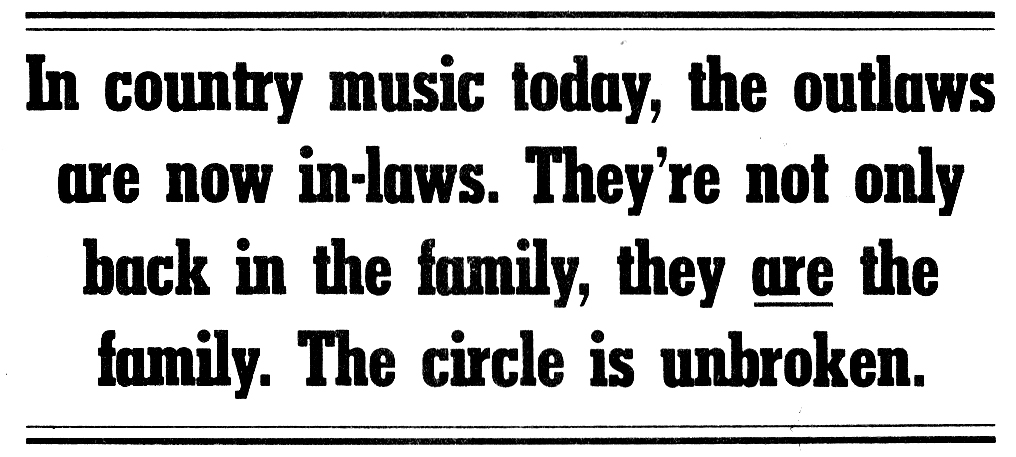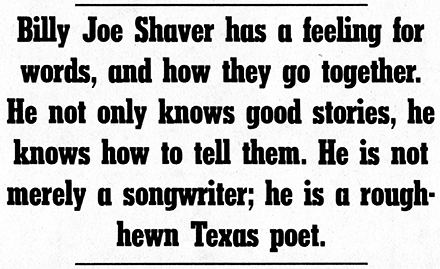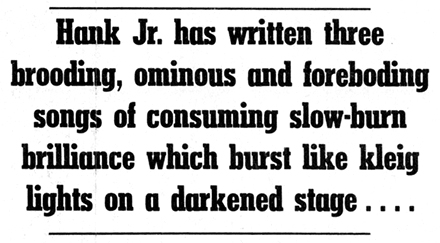
![]() JOHN ANDERSON
JOHN ANDERSON
2
[Warner Brothers BSK 3547]
BOBBY BARE
As Is
[Columbia FC 37157]
LACY J. DALTON
Takin’ It Easy
[Columbia FC 37327]
BILLY JOE SHAVER
I’m just an Old Chunk of Coal (But I’m Gonna Be a Diamond Some Day)
[Columbia FC 37078]
HANK WILLIAMS, JR.
The Pressure Is On
[Elektra 5E-535]![]()
“Country music singers have always been a real close family...”
Hank Williams, Jr
“Family Tradition,”
1979
Except for the early- to mid-70s “outlaw” rebellion and exodus from Nashville (Waylon, Willie, Hank jr., etc.), country music has been a very closed-in, family affair. Everybody knew everybody. The same studio musicians played on virtually every album which came out of Nashville. Record labels had “stable” writers which cranked out those catchy-titled, lovelorn, sad-sad songs-uniformly two and a half minutes long - like so many biscuits from the oven at Hardee’s. Although you might hate somebody’s guts in private, on stage at the Opry it was all smiles and kisses.
Fed up with the corny production values, backbiting and hypocrisy, and the stifling Nashville atmosphere, the outlaws left town and began to make a newer, rawer music of their own. Willie Nelson moved back to Texas. Billy Joe Shaver signed a recording contract with Macon-based and very un-Nashville Capricorn Records. Hank Jr. headed to Alabama to live and ended up recording at Muscle Shoals. Tompall Glasser and Waylon Jennings challenged the system, playing their own music with their own musicians. The middle 70s was probably the most vibrant era in country music since Hank Williams’ burn-out in the back seat of his Cadillac on New Year’s Day, 1953.
Now however, for the most part, the outlaws are in-laws. They’re not only back in the family, they pretty much are the family. The circle is unbroken. Another movement has been weathered and it’s business as usual in Nashville.
Business as usual might not be that bad, it’s just that, with few exceptions, it’s really not all that consistently good, either.![]()
Lacy J. Dalton, upon the release of her first album in 1980 was hailed as the “country Janis Joplin,” a gravel-throated honky-tonk woman who was writing good songs, to boot. The next big thing, etc.
And maybe she will be TNBT - I don’t know. What I do know is that she’s not country’s Janis, and will never be if she remains a Nashville cat. Her deep, husky voice is more suited for R&B wailing (Joplin, Bonnie Bramlett) than hell-raisin’ country twangin’, and R&B is just too black for the Nashville Establishment to deal with (i.e., market). She won’t be the next big songwriter, either. Her output has dropped from eight out of 10 originals on her first effort to five of 10 on number two, and now four of 10 on Takin’ It Easy. Which is not to say, however, there is nothing of merit on the album.
“Everybody Makes Mistakes” (co-written by Dalton and producer Billy Sherrill) and “Feedin’ the Fire” are two of the absolutely best songs released by a female country artist this year (and yes, that includes Rosanne Cash and Juice Newton), and make the rest of this average album worthwhile. Both songs are MOR to the core, but not smarmy; and each contains enough style and intelligent songwriting to preclude any kind of pre-teen Kenny Rogers-ite from caring a hoot for them (it’s not that kind of MOR).
“Mistakes” features a fine vocal and lyric from Dalton conveying a perfect mixture of hurt, innocence, trust, hard-earned wisdom and the results of love (good and bad) which can haunt one for years. “Fire” doesn’t say as much as “Mistakes,” but it doesn’t need to. Sherrill’s production makes this song, using acoustic guitars, a modern Motown feeling in places and three different sets of hooks. The rest of the record wanders aimlessly between covers (an overdone “Where Were You When I Needed You,” an unconvincing “Comes a Time”), southern gothic (“Somebody Killed Dewey jones’ Daughter”), honky-tonkers (“Wild Turkey”) and a jimmy Buffett clone (“Takin’ It Easy”) which in no way approach the heights of “Mistakes” and “Fire.”![]()
John Anderson’s 1980 self-titled debut caused about as much commotion (at least with the critics) as did Dalton’s. “Maybe this isn’t the best country album of 1980 . . .,” said Village Voice critic Robert Christgau, “but not since Hank Williams, Jr. fell off his mountain and Gary Stewart fell off his barstool has anybody put so much vocal muscle into unadorned hard stuff.”
Agreed, so what happened on 2? Andersons’ George jones twang cum Hank Jr.’s low end got fat and his choice of material went from good to average. Most of 2’s ten songs roll by slower than mid-summer afternoons and don’t carry the punch required to keep one interested. Basic country lyrics prevail: Drinking, good/bad women gone good/bad, etc., and only snap out of the doldrums on “July 12, 1939” (another gothic steamer), “Chicken Truck” (an Anderson original better suited for bar- than living-room listening) and the subtle, sure, ironic humor of Billy Joe Shaver’s “I’m just an Old Chunk of Coal (But I’m Gonna Be a Diamond Some Day).” Anderson’s second album ends up at best uneven and his “Havin’ Hard Times” from the debut remains more compelling than all of 2 put together.![]()
Mentioning Billy Joe Shaver and the best country record of the year in such close proximity may become the “in” thing by December, 1981. Arguably the best songwriter of the genre, you’ve probably heard his songs though you may not have heard him. Willie Nelson. Bobby Bare, the Allman Brothers Band, and Waylon Jennings (whose classic Honky Tonk Heroes was written almost entirely by Shaver) have all covered his music, and he continues after 15 years of composing to turn out country gems with wit, grace, humor, spunk and’ emotion; without getting treacly, maudlin or just plain stupid.
Shaver wrote all the songs on Coal and in the best Texas/country tradition talks about “Mexico,” “Saturday Night,” “The Road,” cowboys, trucks, the “Blue Texas Waltz,” Stetsons and women of all kinds; nothing much more· than any other country disc might mention. The difference is (and the difference can be measured in light years) Shaver has a feeling for words and how they go together; he not only knows good stories, he knows how to tell them. He is not merely a songwriter; he is a rough-hewn, dirt-in-his-boots Texas poet, writing songs which evoke from those wide open spaces as many and as varied feelings as did Peter Bogdanovich in The Last Picture Show.
“When the Word Was Thunderbird,” a remake from his 1976 Capricorn album takes center stage on Coal just as it did on When I Get My Wings. Upbeat, with a smoother rhythm backing that the Wings version, it sounds almost like a different song. The words, however, and Shaver’s sometimes flat, sometimes yodeling vocal transcend the music:
Married to a civic-minded social girl
Taking short cuts in a woman’s world
She won’t let her hair down when I’m home Society is just slavery and security is a killin’ me
I worked hard for it but I’d give it all away
If I could go back to yesterday.*
In a completely different mood on “Fit to Kill and Going Out in Style,’’ things aren’t as bad for Shaver; He’s got money, “a pickup full of good gasoline,” and enough Waco charm to stretch from one end of Texas to the other. He’s also got himself a high-ridin’ cowgirl:
My woman is the queen of the world
She ain’t just an ordinary girl
She makes country lovin’ like an oyster makes a pearl… **
With imagery like that, it’s hard to go wrong, and since such verbal diamonds are strewn throughout Coal, it would be well worth anyone’s time to become acquainted with Billy Joe Shaver.![]()
Though not the consistent craftsman Shaver is, at least Hank Williams, Jr. (unlike most of his compadres who know it’s easier to copy than create, and choose to settle for that) still writes most of his own; ragged-edged, if-it’s-even-close-to-rhyming-use-it, type music. And not JUST on the new album. In little over two years he has recorded around 30 new songs on five albums and has written no telling how many others still on paper.
The Pressure Is On has its clunkers. Do we really need another version of “Tennessee Stud?” Or another train song (“Rambling in My Shoes”)? Or Hank caught up in his own catch-22 (“The Coalition to Ban Coalitions”?) NO!
Pressure is also filled with the stock Hank Jr. fodder we’ve come to expect over the last couple of years: Name-dropping (Waylon and Jessie, Johnny Cash, Kris Kristofferson, Jimmie Rodgers), a duet with someone of like stature (George jones, on Hank Sr’s. “I Don’t Care (If Tomorrow Never Comes)”), a song about “Daddy,” and the autobiographical “All My Rowdy Friends (Have Settled Down),” which in a name-dropping frenzy has references to virtually all of the above.
But Pressure contains three brooding, ominous and foreboding songs of consuming slow-burn brilliance which burst like klieg lights on a darkened stage. Not since 1975’s classic Hank Williams Jr. and Friends has Hank Jr. written songs with such power and emotion.
A dark ode to survivalists, hillbillies, woodsmen, and people in general who have given city life the finger, “A Country Boy Can Survive” rumbles through the speakers as if the apocalypse were just around the corner. There ain’t no “Thank God I’m a Country Boy” whooping-it-up hilarity here, just the bare facts: Surviving is tough, it’s even tougher without cars, electricity, dish washers, etc., and damn-it-to-hell, country folks are gonna witness the Second Coming alive and well, thank you, while city folks decay in nuclear graves in what used to be a big city.
“Weatherman” extends the dark Imagery of gray skies, tornados and rain, this time drawing analogies between a rocky love life and the weather forecast:
Mr. Weatherman…
Everything’s been going wrong
Please tell me it’s something in the ozone
Or is the atmospheric pressure just too strong?
I can’t ride out one more storm… ***
Slow, with an appropriate build-up in vocal and musical intensity, Hank Jr. has not sounded this vulnerable since “Living Proof’· from the Friends album.
If possible though, the haunting, spacey, doom-filled arrangement of the title track surpasses both of the preceding songs. Hank Jr’s rear moan floats over crying guitars and blues organ (by current Allman Brothers Band member Mike Lawler). Again the problem is the “other” woman-but the lyrics speak to the issue stoically and unsentimentally, like a man who is possessed and knows that nothing but time, for better or worse, can be his exorcist. “Pressure” bursts with tension, drama, and more than a hint of tragedy; and few songs (“Please Call Home,” perhaps) come close to matching its emotional power.![]()
A song such as “Pressure” makes having to listen to drivel such as Bobby Bare’s As Is somehow seem worth the time. Like Shaver and Hank Jr., Bare has been around for quite a while; but unlike their discs, As Is contains no original material and is the least interesting of the bunch. Like dog food compared with prime rib.
Void of everything except country clichés, the album rarely rises above the mundane, much less the average. Bare no longer straddles the fence between the outlaws and mainstream (that is, where the fence still exists)-this is pure MOR country and all that negatively implies: Pleasant, nice, a sleeping aid. He covers Willie, Tom T. Hall, J,J, Cale and Townes Van Zandt, and, well, so what’s on T.V. tonight? Only “Dollar Pool Fool” catches the ear with its seamless production job (by Rodney Crowell), Bare’s smooth, full-bodied voice - like molasses with some grit in it-and lyrics like:
She’s a tantalizing stepper
And a mighty handsome dresser
You can hear them neck bones pop when she walks by. **
Otherwise, leave As Is as is.
Bare’s album, though, is only a symptom of a larger Nashville malaise, which can be traced back to the pre-outlaw years. Each of the albums reviewed here was made in Nashville. The musicians and producers are pretty well interchangeable: Substitute one for the other and the outcome of a particular album wouldn’t be changed a white. All of the musical innovations of the mid-70s have been assimilated into the mainstream so that now, it once again looks like (barring the occasional excellent lyric or melody) Nashville is to music what T.V. is to mental health.
Personally, I’ll take insanity.
-Steve Hurlburt
*COPYRIGHT 1970 ATV MUSIC CORP.
**COPYRIGHT 1979 HOUSE OF CASH, INC.
***COPYRIGHT 1981 BOCEPHUS MUSIC CO.